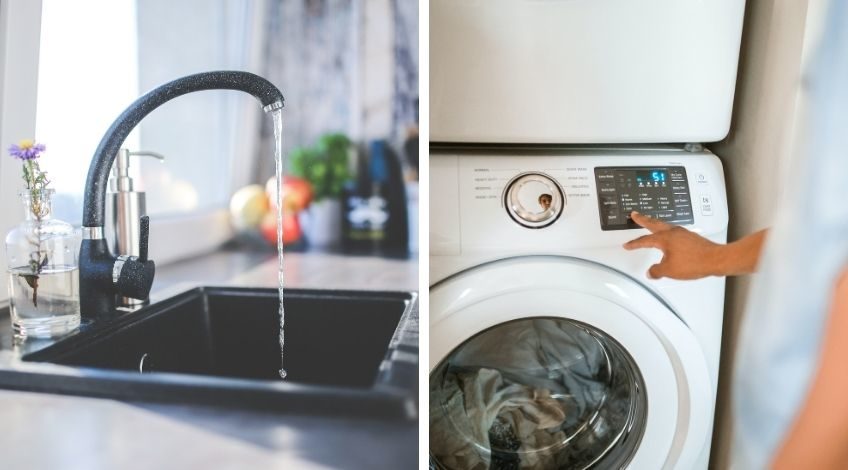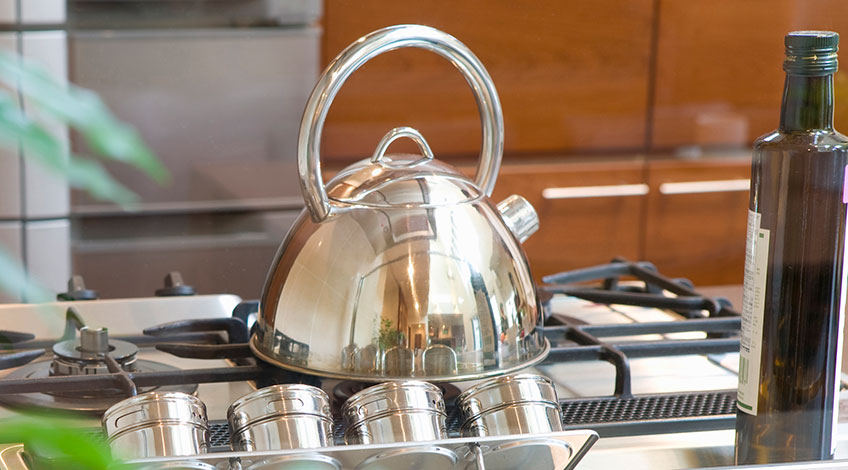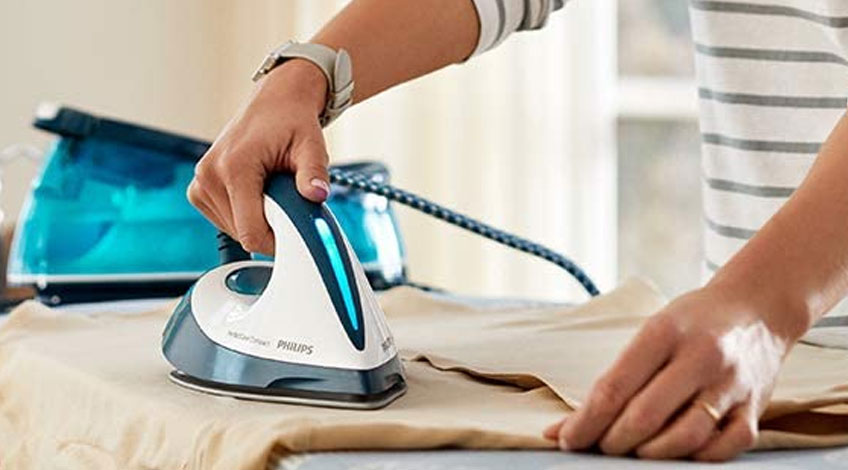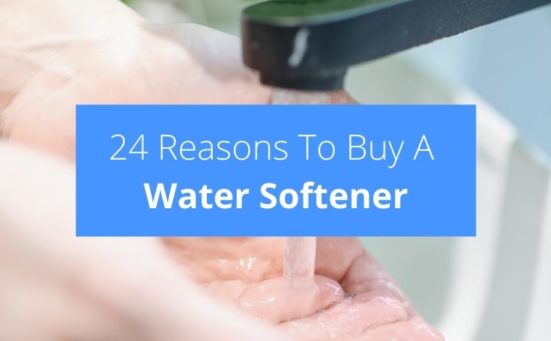 Last Updated: May 2025
Last Updated: May 2025 Best Water Softeners 2024
If you live in the United Kingdom, there’s a high chance of you living in a hard water area. In fact, unless you live in Wales, Northern Ireland, Scotland, Cornwall or the North West of England you definitely live in an area affected by hard water.
Best Selling Water Softeners UK
- Compact design: fits in a kitchen cupboard
- Easy to install
- Enjoy Quality Softened Water from Every Faucet! iSpring WCS15KG whole house water softener system has a high capacity for treating hardness. It removes calcium and magnesium from your water at the point of entry, providing you with quality soft water for cooking, bathing and laundry. This water softener can be installed in businesses, institutions, hospitals, schools and other enterprises.
- Protect Your Household Appliances and Plumbing from Scale and Expensive Repairs: The WCS15KG whole house water softener descales your entire water system and prevents scale buildup in water heater and pipes.
- 8 Litre DVA Water Softener Manual Salt Regeneration Type for Commercial Dishwasher GLASSWASHER Coffee Machines ETC.
- Product type: DISHWASHER DETERGENT
- Family sized water softener
- Fits in a kitchen cupboard
- 12 Litre DVA Water Softener Manual Salt Regeneration Type for Commercial Dishwasher GLASSWASHER Coffee Machines ETC.
- Product type: WATER PURIFICATION UNIT
What Causes Hard Water?
Rainwater is soft water, it falls from the clouds and lands on the ground, this is where the water potentially changes from soft to hard. How? As the water passes through the ground, and into porous rocks, it dissolves and collects certain minerals from the rock, usually magnesium and calcium.
It’s these minerals that make the water hard, the higher the level of minerals the harder the water becomes. So if rainwater falls on non-porous rocks, it can’t penetrate them and remains soft water, it’s all about geology and geography really. The majority of the UK has high levels of porous rock that causes rainwater to become hard water.
Why Is Hard Water A Problem?
This is a good question, talk to a medical professional and they will tell you hard water is better for the human body than soft water. This is due to those minerals in the water, the human body needs these minerals to function efficiently. The problem is those minerals cause serious problems for our appliances.
The minerals in hard water pass through the cold tap without causing too many issues, it’s when the water is heated up it causes problems. This is because once heated up, the minerals leave deposits behind, we can recognise these deposits as limescale. Scale builds up over time, probably the easiest place to spot this scale is in an electric kettle.
What Problems Does Scale Build Up Cause In Household Appliances?

In all appliances that heat up water in the home, hard water scale build-up causes irreparable damage. At the least problematic end of the scale (no pun intended), limescale build-up in a kettle causes off tasting beverages, longer boil times, and unappetising looking elements or kettle bottoms. Plus taps become jaded and dirty looking, showerheads block up, and glass shower doors are constantly in need of cleaning.
At the extreme end of the scale, are problems associated with broken appliances like washing machines, dishwashers, coffee makers, and other domestic appliances. Even worse limescale build-up can cause boiler breakdowns, blocked valves, blocked pipes, and higher electricity and gas bills. The solution to all of these problems is a water softener.
How Water Softeners Work
Water comes into the home via a mains pipe, this then lets the water flow through the pipes in the house. A water softener is fitted between the main inlet pipe and the rest of the water pipes. This softens the water and makes it safe for use with all appliances.
There are 2 types of water softeners and they work in different ways. Let’s take a closer look and see which type will suit your needs best.
What Are The 2 Types Of Water Softener?
The 2 types of water softeners are salt-based, and salt-free systems. To understand both of these systems better we need to get a bit technical but bear with us.
Salt-Based Water Softener Systems
Inside the water softener is a container filled with resin, it’s this resin that extracts the minerals out of the water. Once the water passes out of the water softener it has been changed into soft water. The water softener self cleans by passing a saltwater solution through the resin, cleaning out all the hard deposits.
In salt-based systems, there are 2 choices, single-cylinder and twin-cylinder softeners. In a single-cylinder system, you need to be sure it has at least 13 litres of resin to work effectively.
Salt-based systems change the chemical composition of the water making it taste better, sud up more when using soap, and prevent the build-up of limescale.
Salt-Free Water Softener Systems
These are basically water descalers as opposed to actual water softeners. The chemical composition of the water stays the same, but the minerals that make the water hard are prevented from sticking to the surfaces of your appliances. Some use electromagnetic technology, whilst others use nanotechnology in a compact unit.
The electromagnetic systems need a power source whereas the nanotech ones don’t need any external power supply. As a general rule, salt-free systems tend to be easier to install and much cheaper than salt-based systems. So water from salt-free systems is still hard water and does not lather up soap suds, but does prevent limescale build-up.
What Are The Benefits Of A Water Softener?

Depending on what system you choose, the benefits associated with installing a water softener are :
- Cheaper power bills-As the scale is removed from kettle elements, boilers, washing machines, dishwashers and any other appliance you own that heats up water, you will find it takes less time to heat up. Thus saving energy and power.
- Appliances last longer-Less scale means the heating elements don’t need to work as hard, which means they will last longer.
- More efficient heating-If you rely on water heated radiators, you will find as the pipework loses scale, the hot water will flow quicker allowing rooms to heat up faster, using less energy.
- Cleaner bathrooms-Less minerals in the water mean less scale build-up on taps, sinks showerheads, glass shower doors and tiles.
- Shorter cleaning time-Less limescale means less dirty deposits and more time between cleaning.
- Softer laundry-You will notice towels and other items of clothing much softer to the touch, no more scratchy towels.
- Less money spent on soaps-Soft water uses less soap to create more bubbles and lather. Plus with less mess, you’ll need less cleaning detergents as well.
- Better tasting beverages-If you opt for a salt-based system you will experience hot drinks with no scum floating on the top.
What Are The Disadvantages Of A Water Softener?
The main disadvantage is the cost, whilst salt-free systems are much cheaper to buy than salt-based systems, any type of water softener will need to be installed by a professional. Salt-based systems rely on you adding salt to remove the minerals from the resin and some of this will get into your hot drinks. From a health perspective, hard water has more minerals that are necessary for the human body to function properly, so removing them is not a great decision if health is one of your priorities.
Water Softener Buyers Guide
There are many things to take into consideration before you make your choice on which water softener to buy. Here are the main points in no particular order.
Which Type Of Water Softener Is Best Suited For Your Home
The 2 main systems are salt-based and salt-free, both descale the water, but salt-based actually softens the water, whereas salt-free just removes certain minerals. Another consideration if you decide to go for a salt-free system is which type, electromagnetic or nanotech. Electromagnetics need to be situated near an electrical power source.
Nanotech are literally fitted into the pipes, need no power to operate, and are usually easier to install and less costly (no operating costs or salts to replace). As stated earlier, if you are contemplating a salt-based system, you need to consider which is best for your home. A single or twin-cylinder system.
How Much Space Does The Water Softener You Prefer Take Up
Most types of water softener are situated close to the entry point of mains water into your home. This is not always the case and is dependent on the type of system you choose.
Size
The nanotech and electromagnetic water softeners tend to be much smaller than the salt-based softeners, it might be you physically can’t have a salt-based system installed because you don’t have the room to accommodate it.
If you go for a salt-based system, the larger units can go on longer between maintenance/refilling with salt. Meaning the larger salt-based systems are more economical as per running costs and maintenance.
How Much Water Do You Use
The number of appliances, baths, showers, sinks etc… you have in your home will determine how much water you use on a daily basis. This is a major deciding factor, as you will need to install a water softener system that is able to cope with the capacity of water that is used.
Water Softener Costs
Apart from the initial cost of whichever system you choose, there are also installation costs and maintenance costs to consider. Whichever system you go for, it will need to be installed by a professional, either a plumber or an engineer, or both in some cases.
Plus salt-based systems will need to be refilled with salt every so often, and although it’s not that expensive, it is an additional cost to be factored in.
Ease Of Installation
The ease with which a water softener system can be installed will very much affect the price. The easiest system to install is the nanotech unit, this uses no power at all apart from water pressure. Next is the electromagnetic unit that needs attaching to the water supply and an electrical power source as well.
With the salt-based systems being the largest and most complex systems to install. How much disruption do you want for the installation of a softener system?
Expert Advice
It is well worth consulting an expert before you make your final decision, try to find an independent expert as obviously one from a specific company will be tied to their products.This might be fine, they might have the best products, but it should be your choice. An independent expert will advise on the pros and cons of each system and the suitability and estimated costs of each system.
Ultimately the decision is yours, but an informed opinion will make any decision making easier.
Longevity
Installing a water softener system into your home is one of the more costly outlays you are likely to make. Check how long the unit is guaranteed to last, how reliable is it? Does the company offer a maintenance contract? etc…
Company’s Reliability
Buying a water softener is unlike most other household appliances you will ever purchase. Whatever system you choose, it will need to be installed professionally. Most reputable water softener companies offer: supply only, supply and installation, or supply, installation and maintenance services.
It can be tempting to go online and find the cheapest system and installation package available, only to find it doesn’t do the job properly, or replacement parts are unobtainable. Plus the company might disappear overnight leaving you with a useless system and no way of recouping your money. That’s why we recommend using an established, reputable company with many years of experience in the water softener industry.
Warranty
Any guarantee or warranty is only as good as the company that issues it. That’s why it’s important to use a reputable company to supply and install your water softener system. Or if you do buy a system without installation, buy from a reputable dealer and get a fully qualified plumber or engineer to install it.
Cheaper models tend to have considerably shorter warranties than more expensive models. This is because cheaper units use inferior parts to keep the price down and of course these are not so reliable.
How Much Is A Water Softener?
The price of a water softener is dependent on many factors. Which type of system you choose is just the start of it, but as a general guide, the nanotech softeners are the cheapest to buy starting at around £13 for a basic model and rising to around £70 for the top of the range. The price differences seem to be indicative of pipe sizes and make required.
For electromagnetic softeners prices start at around £30 for the most basic model and rise to £190 for the dearest. The price variations are dependent on make and model.
Salt-based water softener systems range in prices from
- £300 – £750 for a single-cylinder system
- £750 – £2000 will get you a twin-cylinder system
- £2000 will buy you a top of the range system with twin-cylinders
You need to choose wisely as having the wrong system of water softener for your home can inconvenience you by not being reliable, and not able to cope with your water needs.
You will also have to factor in installation costs, these vary depending on which type of softener you choose, plumbers generally charge by the hour and the average rate is currently between £20 – £40 per hour. Depending on the type of job and where in the country you live.
To install a salt-based system charges vary from around £150 – £400 depending on location, type and position. Any prices quoted are subject to VAT and this should be factored in as well.
Frequently Asked Questions
Water softeners can be expensive to buy and install, but depending on the make and model they should run for around 10 years at least. So any initial cost can be broken down over time.
If you have the correct DIY skills it is possible to install some water softeners yourself, but for peace of mind, it is best to rely on an expert like a plumber or engineer.
Depending on the type and make, water softeners have a life expectancy of between 10-20 years. With many lasting twice as long, but nothing lasts forever.
In most cases, you will need to add more salt on a monthly/bi-monthly basis.
Without salt, the system will no longer deal with the minerals in the water. This will allow your pipework, appliances, etc to build-up with scale.
Softened water is considered safe to drink, however, if you are medically intolerant of salts consult your GP before drinking softened water.
Pool salt and water softener salt are interchangeable in most cases but you should check with an expert first.
How often you should replace your water softener resin is dependent on how hard your water is, and what chemicals are present in your water supply. As a rough guide, the resin should be replaced every 10 years.
Installing a water softener is quite expensive but the benefits are definitely worth it.
Water softeners can reduce water pressure as the pipes descale water flows freely but with no obstructions, the pressure can decrease.
Faster than normal salt usage could indicate a leaking valve or improper use of controls.
As water softeners remove the minerals that cause scale build-up, the pipes will clean over time.
Salt-free systems work by crystalizing the minerals in the water. Salt-free systems reduce scale build-up in your plumbing, but that is all they do.
The salty gloop that builds up in the brine tank should be cleaned out at least once a year.
It is generally not recommended to use softened water to water plants, as softened water contains salts, which cause plants to die.
Although softened water is higher in salts, it is lower in calcium and magnesium. It is these minerals that cause streaking etc. when washing the car so in many ways softened water is better to wash the car with than hard water.
The salt in softened water is a different type of salt to the stuff used on roads to melt ice. The road salt will rust your car if allowed to remain on the car, but softened water salt will not rust the car.
The main advantages of using a water softener are: cheaper power bills, appliances last longer, more efficient heating, cleaner bathrooms, shorter cleaning time, softer laundry, less money spent on soaps, better tasting beverages.
Also, follow us on Pinterest ...






